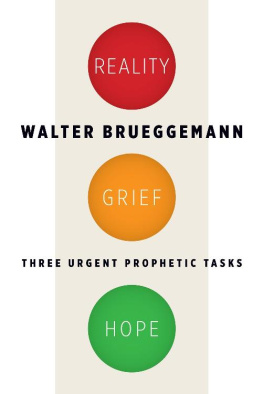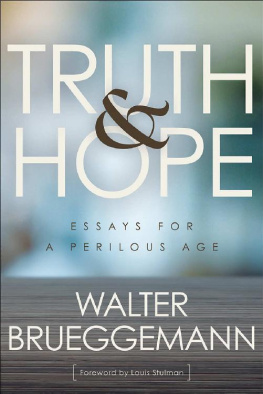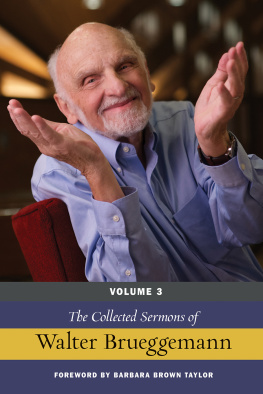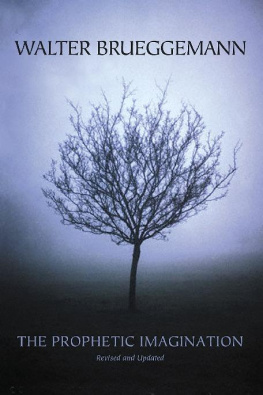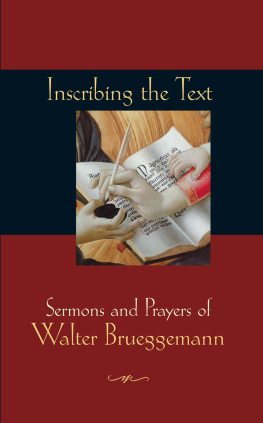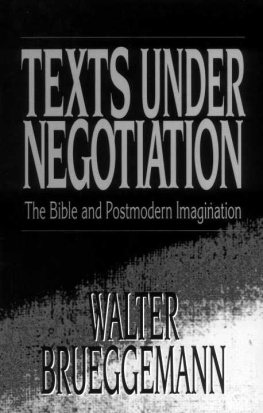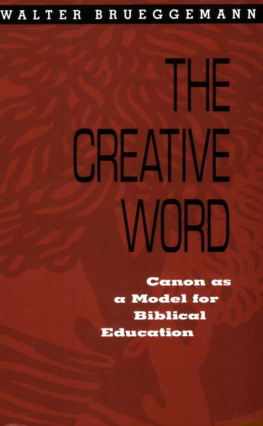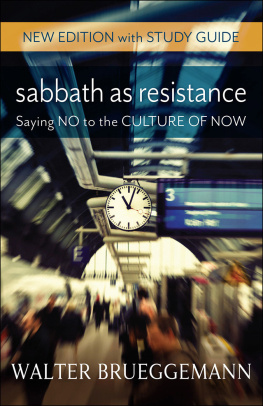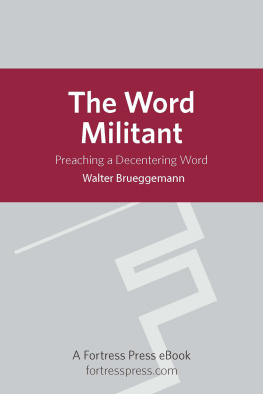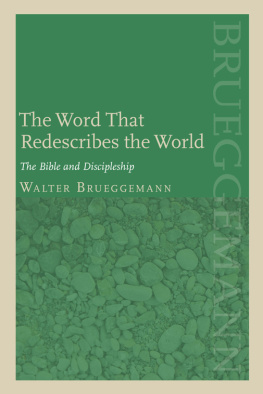Walter Brueggemann - Reality, Grief, Hope
Here you can read online Walter Brueggemann - Reality, Grief, Hope full text of the book (entire story) in english for free. Download pdf and epub, get meaning, cover and reviews about this ebook. year: 2014, publisher: Wm. B. Eerdmans Publishing Co., genre: Religion. Description of the work, (preface) as well as reviews are available. Best literature library LitArk.com created for fans of good reading and offers a wide selection of genres:
Romance novel
Science fiction
Adventure
Detective
Science
History
Home and family
Prose
Art
Politics
Computer
Non-fiction
Religion
Business
Children
Humor
Choose a favorite category and find really read worthwhile books. Enjoy immersion in the world of imagination, feel the emotions of the characters or learn something new for yourself, make an fascinating discovery.
- Book:Reality, Grief, Hope
- Author:
- Publisher:Wm. B. Eerdmans Publishing Co.
- Genre:
- Year:2014
- Rating:4 / 5
- Favourites:Add to favourites
- Your mark:
- 80
- 1
- 2
- 3
- 4
- 5
Reality, Grief, Hope: summary, description and annotation
We offer to read an annotation, description, summary or preface (depends on what the author of the book "Reality, Grief, Hope" wrote himself). If you haven't found the necessary information about the book — write in the comments, we will try to find it.
Reality, Grief, Hope — read online for free the complete book (whole text) full work
Below is the text of the book, divided by pages. System saving the place of the last page read, allows you to conveniently read the book "Reality, Grief, Hope" online for free, without having to search again every time where you left off. Put a bookmark, and you can go to the page where you finished reading at any time.
Font size:
Interval:
Bookmark:
Walter Brueggemann is widely appreciated as the most insightful and compelling interpreter of the Bible as it bears on current social and religious crises. Here he discerns how the arrogant American exceptionalism of Gods new Israel has been powerfully informed by the biblical ideology of Gods chosen people and the exceptionalism of the ancient Jerusalem elite.... Reality, Grief, Hope is timely, prophetic, and very well done.
Richard Horsley
University of Massachusetts, Boston
Brueggemanns connection of Israelite royal ideology with U.S. exceptionalism is provocative and courageous. His interweaving of modern poetry and political theory with Scripture texts powerfully amplifies the countercultural exhortation of the ancient prophets: covenantal faith must be lived in mutual relationship with the poor. Brueggemann calls communities gathered around Scripture to be catalytic in their dismantling of structures of social privilege, economic exploitation, and racism. This is a compelling and urgently needed book.
Carolyn J. Sharp
Yale Divinity School
Challenges the churches to a prophetic task in the face of the twin ills in American exceptionalism: complacency when things go well and self-centered despair when (as after 9/11) they go badly. Brueggemann shows how the witness of the Old Testament prophets can be a resource for faithful hope that does not rest on cynical self-concern. Calling for a wider vision of society and its possible futures than the imperialistic self-assertion of an elite, this book calls for inclusion and for justice.
John Barton
Oriel College, Oxford
Reality, Grief, Hope
Three Urgent Prophetic Tasks
Walter Brueggemann
Foreword by
Louis Stulman
William B. Eerdmans Publishing Company
Grand Rapids, Michigan / Cambridge, U.K.
2014 Walter Brueggemann
All rights reserved
Published 2014 by
Wm. B. Eerdmans Publishing Co.
2140 Oak Industrial Drive N.E., Grand Rapids, Michigan 49505 /
P.O. Box 163, Cambridge CB3 9PU U.K.
Printed in the United States of America1
Library of Congress Cataloging-in-Publication Data
Brueggemann, Walter.
Reality, grief, hope : three urgent prophetic tasks / Walter Brueggemann;
foreword by Louis Stulman.
pages cm
Includes bibliographical references.
ISBN 978-0-8028-7072-8 (pbk.: alk. paper)
eISBN 978-1-4674-4036-3 (ePub)
ISBN 978-1-4674-3994-7 (Kindle)
1. Prophecy Religious aspects Christianity. 2. Hope Religious aspects Christianity. 3. Bible. Isaiah Criticism, interpretation, etc. 4. Bible. Jeremiah Criticism, interpretation, etc. 5. Bible. Lamentations Criticism,
interpretation, etc. 6. Laments in the Bible. I. Title.
BR115.P8B78 2014
234.25 dc23
2013038807
Scripture quotations are from the New Revised Standard Version of the Bible 1989 by the Division of Christian Education, National Council of the Churches of Christ in the United States of America, used by permission.
Excerpts from the poems Thanksgiving Day in the U.S. and Hope are from Threatened with Resurrection: Prayers and Poems from an Exile Guatemalan, by Julia Esquival, copyright 1982, 1994 Brethren Press, Elgin, Illinois. Used with permission.
Excerpt from Tortures from POEMS NEW AND COLLECTED 1957-1997 by Wislawa Szymborksa, translated from the Polish by Stanislaw Baranczak and Clare Cavanagh. English translation copyright 1998 by Houghton Mifflin Harcourt Publishing Company. Reprinted by permission of Houghton Mifflin Harcourt Publishing Company. All rights reserved.
To the Memory
of
J. Davison Philips
Contents
It is great pleasure to write this foreword for Walter Brueggemanns new book, Reality, Grief, Hope: Three Urgent Prophetic Tasks. Walter is a dear friend and an esteemed colleague. Indeed, he has been a formative presence in my life for many years.
My first encounter with his work came in the late 1970s. In a graduate school seminar led by Herbert B. Huffmon, I read three of Walters earliest works, Tradition for Crisis: A Study in Hosea (John Knox, 1968), The Vitality of the Old Testament Traditions (with Hans Walter Wolff; John Knox, 1975), and the recently published The Prophetic Imagination (Fortress, 1978). These books made an enormous impression on me. In the first place, they were beautifully written and theologically penetrating. I was also captivated by their audacity to move beyond the historical perimeters of the text to the contemporary world. Reviewers recognized this quality as well. One, for instance, noted that Tradition for Crisis relates the prophets to contemporary Christians, and another recognized the convincing lines of argumentation for a contemporary view of Hosea. It was apparent from the start that Brueggemanns close reading of the biblical text was neither neutral nor dispassionate, as the rubrics of the field demanded. Rather, his nuanced exposition was attentive to ecclesial realities especially those related to pastoral ministry and the larger society. Put differently, Brueggemanns earliest writings already reflected a firm commitment to make the interface of ancient text and contemporary community... poignant and palpable.
In my first decade of teaching at a small theological school in Ohio, I deployed Walters works in almost all of my classes. On the Pentateuch we read his commentary on Genesis (John Knox, 1982). In my Prophets class I assigned The Prophetic Imagination (Fortress, 1978) along with the equally eloquent Hopeful Imagination (Fortress, 1986). Required reading in Psalms and Wisdom Literature included In Man We Trust (John Knox, 1972) and The Message of the Psalms (Augsburg, 1984). Brueggemann was a good companion in those classes which, I gladly concede, were essentially teach-taught (I suspect many others could make a similar confession). It never surprised me that his robust engagement with the text and rich interpretive move into contemporaneity resonated with my students and became their model for exegetical and homiletic practice. They had little interest in reading Scripture as an archive of the past, and even less enthusiasm for bracketing out theological questions. Brueggemanns dogged commitment to weave contemporary issues into his interpretive work was a godsend to us.
In the 1990s I had the privilege of working with Walter as well as with Kathleen OConnor, Pete Diamond, Ronald Clements, and Robert Carroll in a Society of Biblical Literature Group on the book of Jeremiah. Kathleen, Pete, and I were relatively new to the enterprise, perhaps with a few fresh ideas, but clearly standing on the shoulders of giants. What developed from those conversations on Jeremiah was a decisive shift from preoccupations with compositional history and the biography of the prophet to a text-centered and reader-centered exploration mindful of synchronicity, theological engagement, hermeneutics, and contemporaneity. Brueggemann punctuated the project with a reference to George Steiners definition of critic and reader: The critic prescribes a syllabus; the reader is answerable to and internalizes a canon.
Since then Walter has written hundreds of articles and books, including Old Testament theologies, numerous commentaries, introductions to the Old Testament, and collections of sermons and prayers. This remarkable body of work is diverse and wide-ranging; in many respects it is as undomesticated as the holy text it explicates. If there is a Mitte, a core, or quality that holds together Brueggemanns diverse and dynamic oeuvre, however, I wonder if it is not a propensity for reading the biblical text as a living countertestimony and a stirring witness to the unsettled God whose words ever disrupt our predictable categories and habits of injustice. In more prosaic terms, Walters intense theological engagement with the Bible never ignores the pressing issues that confound the church, pastoral ministry, and society. No wonder this leading and generative voice in the church is also one of our most daring cultural critics.
Next pageFont size:
Interval:
Bookmark:
Similar books «Reality, Grief, Hope»
Look at similar books to Reality, Grief, Hope. We have selected literature similar in name and meaning in the hope of providing readers with more options to find new, interesting, not yet read works.
Discussion, reviews of the book Reality, Grief, Hope and just readers' own opinions. Leave your comments, write what you think about the work, its meaning or the main characters. Specify what exactly you liked and what you didn't like, and why you think so.

